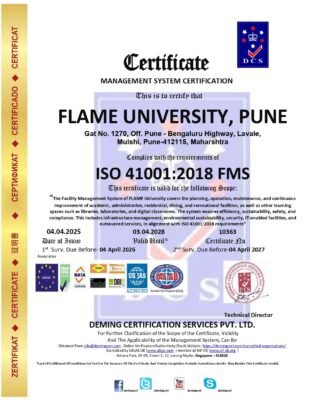ISO 21001 Educational Organization Management Systems
ISO 21001 is an international standard for Educational Organization Management Systems (EOMS), designed to help institutions improve the quality of their educational services and better meet the needs of learners and other stakeholders.
Purpose and Scope
ISO 21001 provides a framework for any organization that delivers education or training, including schools, colleges, universities, corporate learning departments, and e-learning providers. It focuses on managing educational processes, supporting learner competence development, and ensuring a learner-centered approach, promoting innovation and continuous improvement.
Key Features
-
Aligns educational activities with the organization’s mission, vision, and policy.
-
Supports inclusive and equitable education for all, emphasizing learner-focused and transparent educational practices.
-
Applies to organizations regardless of size, educational method (distance, in-person), or whether education is their core or secondary business.
-
Specifies requirements for admission, learner traceability, certification, staff competence standards, resource management, and information management.
-
Integrates national and international laws and regulations, offering a holistic approach to management in education.
Benefits
-
Improved learner and stakeholder satisfaction through effective management and continual system improvement.
-
Demonstrates commitment to quality education and enhances the credibility of the institution.
-
Helps organizations systematically improve processes and outcomes, increasing transparency and competitiveness.
-
Especially beneficial for institutions with diverse learners, including those with special needs or in distance education.
Applicability
ISO 21001 is generic and can be applied to all types of educational organizations using a curriculum for competence development, regardless of their size, education level (from pre-school to higher education), or geographic location.
Relationship With Other Standards
ISO 21001 builds upon ISO 9001 (Quality Management Systems), but is specifically tailored to the unique requirements and interactions in educational environments.
In summary, ISO 21001 provides a powerful management framework for educational organizations aiming for high standards, inclusivity, transparency, and ongoing improvement.
What are the main clauses and structure of ISO 21001
ISO 21001 follows a structured approach containing ten main clauses, each defining essential requirements for Educational Organization Management Systems (EOMS).
ISO 21001: Main Clauses and Structure
| Clause | Focus/Content |
|---|---|
| 1. Scope | Defines what the standard covers and its intended application. |
| 2. Normative References | Lists referenced standards and documents. |
| 3. Terms and Definitions | Explains key terms for consistency throughout the standard. |
| 4. Context of the Organization | Requires understanding the organization’s environment, stakeholders, and scope. |
| 5. Leadership | Focuses on management, policy, roles, responsibilities, and commitment. |
| 6. Planning | Covers risk, opportunity, objectives, and planning for changes. |
| 7. Support | Addresses resources, competence, awareness, communication, documentation. |
| 8. Operation | Details operational planning, educational products/services, design and delivery. |
| 9. Performance Evaluation | Requires monitoring, measurement, analysis, evaluation, audits, and reviews. |
| 10. Improvement | Focuses on nonconformities, corrective action, and continual improvement. |
Structure Highlights
-
The standard is based on the High-Level Structure (HLS) used in other ISO management systems such as ISO 9001 and ISO 14001, facilitating integration across multiple frameworks.
-
Each clause contains specific requirements aimed at driving continual improvement, learner focus, and effective management processes tailored to education.
-
Clauses 1-3 are introductory, while clauses 4-10 form the heart of the management system requirements.
This structure ensures educational organizations can consistently manage and improve the quality of their educational services according to internationally recognized best practices.
Implementation checklist and timeline for ISO 21001 certification
An effective implementation checklist for ISO 21001 and a typical certification timeline involve several structured steps. For most educational organizations, the process usually takes around 6 to 12 months, depending on size and readiness.
ISO 21001 Implementation Checklist
-
Understand ISO 21001 requirements and define the scope for the Educational Organization Management System (EOMS).
-
List all relevant stakeholders (learners, staff, parents, regulatory bodies).
-
Set measurable goals related to educational performance and organizational processes.
-
Develop required documentation: quality manual, policies, procedures, work instructions, and records (training logs, assessments, feedback, etc.).
-
Train staff, teachers, and administrators on their new roles, responsibilities, and processes to maintain compliance.
-
Identify potential risks and opportunities within educational and operational settings and develop strategies to address them.
-
Implement operational processes and mechanisms for monitoring teaching, learning, and support services.
-
Conduct internal audits to check compliance with ISO 21001 requirements and address any non-conformities.
-
Hold management reviews to evaluate EOMS effectiveness and seek continual improvements.
-
Prepare for the external certification audit; correct any issues identified during pre-assessment, if conducted.
-
Undergo the certification audit with an accredited certifying body. Address nonconformities if detected.
-
Upon successful certification, maintain regular surveillance audits and persist with continual improvement cycles.
Typical Timeline for ISO 21001 Certification
| Phase | Duration |
|---|---|
| Preparation, gap analysis, planning | 1 – 2 months |
| System development & documentation | 2 – 3 months |
| Staff training & implementation | 1 – 2 months |
| Internal audit & management review | 1 – 2 months |
| Certification body audits & corrections | 1 – 2 months |
| Certification award | At completion |
| Total Estimated Time | 6 – 12 months |
-
Large or complex organizations may require up to 18 months.
-
Ongoing compliance is ensured through periodic surveillance audits after certification.
This checklist and timeline offer a comprehensive roadmap for gaining and maintaining ISO 21001 certification in educational organizations.


Reviews
There are no reviews yet.